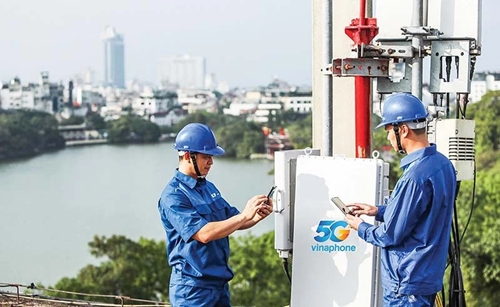The Ministry of Information and Communications has, as of 2024, granted licenses for frequencies to launch 5G networks to major operators like Viettel and VNPT, with a goal of achieving nationwide coverage by 2030. Viettel, the first network to successfully test commercial 5G technology in 2019, has now expanded testing to 61 provinces and cities nationwide.
The application of 5G technology will bring opportunities to many businesses. Sectors with the potential to accelerate the digitalization process, supported by Vietnam’s current legal framework, include banking, Fintech companies, e-commerce businesses, and companies that bring goods and services to online platforms.
    |
 |
|
Telecom giants in Vietnam are taking applications and commercializing the 5G network, expected to generate more opportunities for businesses to accelerate digital transformation. |
The Law on Credit Institutions, effective from July, introduces new provisions to accommodate emerging activities aligned with the digital transformation trend, including authorizing a testing mechanism for Fintech innovations in banking, online lending, and electronic transactions.
To facilitate the implementation of this testing mechanism, the State Bank of Vietnam is developing a draft on a controlled testing framework in the banking sector, focusing on Fintech companies and solutions applied to banking activities.
To prioritize online transactions, the Government has also issued a decree No.52/2024/ND-CP which outlines regulations for non-cash payments, including additional provisions regarding cryptocurrencies, e-wallets, and prepaid cards applicable to credit institutions.
The commercialization of 5G plays a crucial role in supporting the digital transformation goals of credit institutions, enabling digital banks to provide online services more swiftly and efficiently, particularly in real-time transactions such as electronic payments and transfers.
Furthermore, 5G also enhances connectivity and integration with advanced technology platforms like AI, big data, and blockchain, making it easier for digital banks to offer intelligent financial services and strengthen transaction security.
In the context of 5G commercialization, businesses are facing both opportunities and challenges when applying 5G technology in their business activities. Many legal mechanisms need to be improved to further facilitate companies.
Speaking at a recent workshop in Hanoi, President of Ericsson Vietnam Rita Mokbel said for Vietnam, 5G will play a critical role in advancing Industrial Revolution 4.0, attracting foreign investment and driving economic growth. Private 5G networks, in particular, will allow businesses to innovate and reduce costs while providing telecom operators with new revenue opportunities. Overall, 5G will be instrumental in Vietnam’s goal to achieve a digital economy that is expected to contribute 20% of its GDP by 2025.
In the short term, prioritizing investment in technological infrastructure, bolstering security measures, and optimizing electronic transaction processes are essential, said insiders.
They stressed that as legal mechanisms have become fully established and enforced, businesses should engage closely with regulating bodies to ensure the efficient and secure implementation of 5G in their operation.
Source: VNA